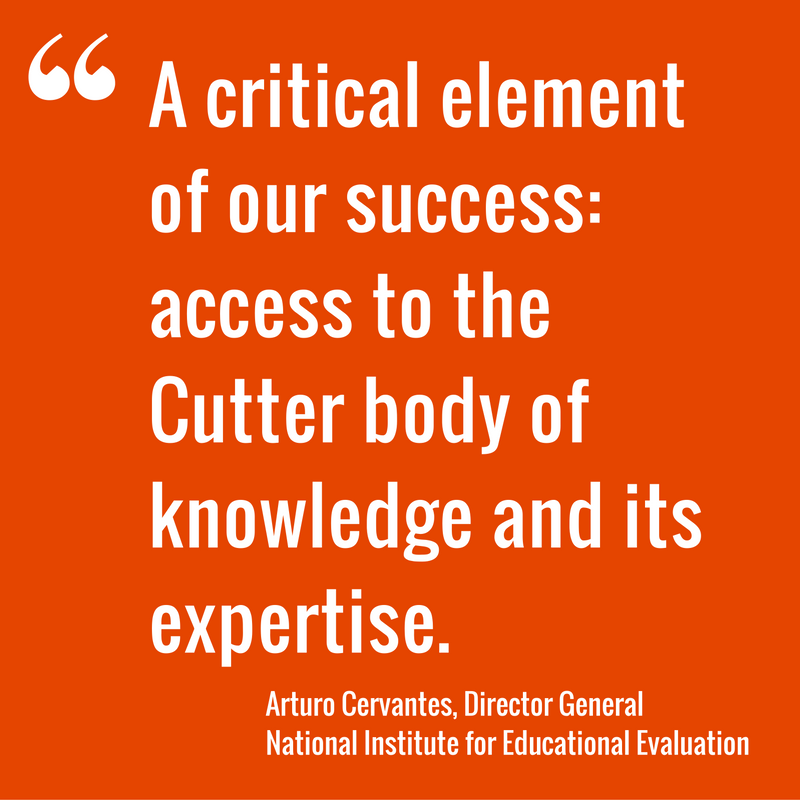Here's a Start ...
Here is a selection of recent research by Cutter experts you can access immediately. As a Cutter community member, you'll have access to every new piece of research on sustainability, technology, leadership, and industry, plus all of our timeless business and technology strategy insights. This includes more than 20 years of articles from our flagship journal, Amplify (formerly Cutter Business Technology Journal.)
Search our archives for a taste of all that's available once your subscription is activated.
Article
Measuring AI’s Impact Across the Fashion Value Chain
Kitty Yeung
Kitty Yeung urges us to elevate our thinking and consider what we are trying to achieve — via AI or otherwise. She argues that the fashion industry has long failed to appreciate the imaginative journeys consumers are taking, journeys that weave together self, situations, social circles, and eclectic wearables. Destructive practices like fast fashion represent flawed attempts to address human complexity with incomplete information, cumbersome supply chains, and a narrow anthropology that undervalues consumers’ creative agency.
Article
A Simulation-First Approach to AI Development
Joseph Farrington
Joseph Farrington emphasizes the importance of evaluating AI systems against their end goals. In healthcare, where developing and deploying AI models is especially challenging, he argues for first modeling the business context and processes the AI will interact with — before moving ahead with development or deployment. This approach can be used to assess, in advance, whether a plausible AI model will provide the intended benefit. It can also be used to run alternative scenarios to identify what else might need to change for the AI to really work or what else might work better if the AI were in place.
Article
AI’s Impact on Expertise
Joseph Byrum
Joseph Byrum introduces a framework to help organizations plan rationally and prudently for AI adoption. One element is defining performance thresholds beyond which emerging technologies become economically viable. Another is assessing how AI and humans should interact across different business functions: some tasks can be commoditized and handled by AI, while others remain critical differentiators under human responsibility, with hybrid possibilities in between.
Article
AI in B2B Publishing: The Promise & the Peril
Daniel Flatt
Daniel Flatt contends that an evaluation framework that promotes accuracy and objectivity is a commercial necessity. He points to B2B publishing as a sector of particular note: an industry built on credibility and accountability that AI could undermine, even as it offers opportunities to accelerate time to output. In response, new tools for detecting inaccuracy and bias in AI-generated copy are emerging, alongside collaborations across the publishing workflow and the wider industry.
Advisor
On-Orbit Data Centers: Enabling Technologies & Emerging Capabilities
Curt Hall
This Advisor series explores the emergence of on-orbit data centers — space-based platforms that enable real-time, AI-powered data processing and analysis directly in orbit. Here in Part I, we examine the enabling technologies, key benefits, and transformative potential of these systems for autonomous space operations, Earth observation, defense, manufacturing, and beyond.
Advisor
Stop Wasting Board Expertise
Siah Hwee Ang
Most organizations underutilize their boards, treating directors primarily as oversight agents rather than strategic partners. This Advisor recommends a shift toward deeper, ongoing engagement between directors and management to unlock the full value of board expertise. By institutionalizing both hard and soft skills — through regular interaction, strategic involvement, and better succession planning — organizations can ensure board knowledge becomes a lasting asset, not a transient one.
Advisor
Operationalizing Nature Positive Actions
Dan Salas, Caroline Hernandez
As biodiversity loss intensifies, companies face mounting pressure to integrate nature positive actions into their sustainability strategies. This Advisor explores how businesses can operationalize these efforts by leveraging established tools and frameworks to assess nature-related risks and opportunities. It also highlights the importance of third-party verification to avoid greenwashing and ensure meaningful outcomes.
Advisor
Powering Real-World Innovation with Quantum Algorithms
Michal Baczyk
This Advisor explores the accelerating convergence of academic research and industry investment in quantum algorithms, marking a shift from theoretical promise to practical application. From simulating molecules in drug discovery to optimizing logistics and advancing financial modeling, quantum algorithms are beginning to deliver domain-specific value. As industries invest in identifying where quantum advantage matters most, the focus is turning to integrating these tools into real-world workflows and architectures.
Advisor
The Complexity Paradox: How CEO Overconfidence Shapes Strategy
Shuhui Wang, Hirindu Kawshala
This Advisor explores how CEO overconfidence influences firm complexity, drawing on analysis of over 14,000 earnings call transcripts. While confident leaders may aim to streamline operations, the findings show a 3.1% reduction in complexity among firms led by overconfident CEOs — raising concerns about oversimplification. Boards and investors should carefully evaluate whether reduced complexity reflects strategic clarity or signals deeper organizational blind spots.
Advisor
A Scalable Framework for Decarbonization & Biodiversity Gains
Margaret Waldock, Jonathan Wagar, David Jeffrey Ringer
This Advisor explores how campuses and peri-urban communities can become powerful agents of climate action by implementing decarbonization strategies within a broader framework developed by Duke Farms. By integrating emissions reductions with biodiversity and carbon-sequestration goals, it highlights scalable, place-based solutions that address the urgent need for local action in the face of global environmental threats.
Advisor
Battling Deepfakes with AI-Driven Cybersecurity
Curt Hall
This Advisor explores how cybersecurity vendors are harnessing AI to detect and counter increasingly sophisticated deepfakes. It examines emerging capabilities such as multimodal detection engines, real-time threat mitigation, forensic analysis, and behavioral biometrics — technologies designed to safeguard organizations against fraud, impersonation, and synthetic media manipulation.
Advisor
Leading with Responsibility: Navigating AI Risks in a Digital Future
San Murugesan
AI’s rapid adoption offers transformative potential but also introduces significant risks — some with potentially irreversible consequences. This Advisor highlights the importance of strategic leadership in managing these risks through integrated business, AI, and organizational strategies. It underscores the need for human oversight in critical systems, structured AI risk management frameworks, and a commitment to responsible development.
Advisor
The Sustainability Canvas: Integrating Strategy, Efficiency & Impact
Paul Godfrey, Vishal Gajjar
This Advisor introduces the Sustainability Canvas, a strategic framework designed to help CSOs and business leaders develop integrated, long-term sustainability programs. Anchored by four compass points — internal versus external focus and private markets versus the public square — the Canvas identifies key areas of sustainability action across compliance, efficiency, innovation, and community engagement. By linking activities across these quadrants, organizations can unlock synergies that drive economic, social, and strategic value.
Article
Boards Under Fire: Fulfilling Fiduciary Duty in an ESG Environment
Trevor Hunter
Trevor Hunter examines how leader character strengthens board decision-making. As ESG considerations and the UN’s Principles for Responsible Investment (PRI) reshape board responsibilities, directors are now accountable to a broader set of stakeholders beyond shareholders. Hunter draws on the Leader Character Framework developed by Mary Crossan, Gerard Seijts, and Jeffrey Gandz of Canada’s Ivey Business School, highlighting its role in navigating complex — and sometimes conflicting — obligations.
Article
Overconfident CEOs: Simplifying Firms & Ignoring Risks
Shuhui Wang, Hirindu Kawshala
Shuhui Wang and Hirindu Kawshala analyze more than 14,000 earnings call transcripts to examine how CEO overconfidence impacts firm complexity. They find that overconfident CEOs tend to reduce complexity, often at the cost of long-term alignment, as illustrated by John Flannery’s short tenure at General Electric. Their study underscores the importance of aligning CEO traits with a firm’s strategic and operational needs, particularly during leadership transitions. Boards must discern whether simplification efforts reflect sound strategy or risky overconfidence.
Article
Institutionalizing Board Knowledge
Siah Hwee Ang
Siah Hwee Ang calls for a shift in how executives engage with boards — not just as monitors or advisers but as long-term strategic assets. He advocates for structures that tap into directors’ expertise through agenda setting, follow-ups, and subcommittees. Boards’ hard skills can be institutionalized via staggered succession, while soft skills can be preserved by documenting decision-making processes. Regular engagement is key, with boards contributing to short-, medium-, and long-term strategic discussions.
Article
Innovation Starts in the Boardroom & Committees Are Where It Comes to Life
Filip Lestan, Ruy de Quadros Carvalho
Filip Lestan and Ruy de Quadros Carvalho analyze 249 Brazilian firms to assess how board structure influences innovation governance. They found that forming innovation-related committees is far more impactful than vision statements or rhetoric, enabling boards to ask better questions and oversee complex initiatives. Larger boards are more likely to form such committees, while CEO duality and director busyness significantly reduce the likelihood. The article concludes with four actionable steps to strengthen innovation governance through board design.
Article
How AI Could Reshape the Boardroom
David Larcker, Amit Seru, Brian Tayan, Laurie Yoler
David F. Larcker, Amit Seru, Brian Tayan, and Laurie Yoler explore how AI could reshape boardrooms by enhancing the volume, quality, and timeliness of information available to directors. AI can reduce information asymmetry, support predictive analysis, and enable real-time scenario planning. These tools help boards become more proactive and better prepared for meetings. However, the authors caution that greater access to information may blur the line between governance and operations, requiring executives to manage directors’ deeper involvement carefully.
Article
Corporate Boards: Navigating Decision-Making & Priorities in Complex Times — Opening Statement
Mirko Benischke
This issue of Amplify invites a reexamination of what makes boards truly effective. It features a collection of articles that explore how boards can evolve beyond conventional roles to become active stewards of long-term value — drawing on leader character, data and analytics, behavioral insight, structural design, and strategic engagement.
Article
When Are Lead Independent Directors Essential & When Are They Not?
Alessia Falsarone
Alessia Falsarone examines the evolving role of lead independent directors (LIDs), offering a five-part framework to assess when and how to appoint them. Although LIDs can strengthen board independence and communication, their function varies by context. In firms where the CEO also chairs the board, LIDs often serve as a bridge to management and stakeholders. In other cases, they foster open dialogue on issues like ESG and AI ethics. Falsarone illustrates this with examples, including Coca-Cola’s LID leading efforts in transparency and sustainability amid activist pressure.






















